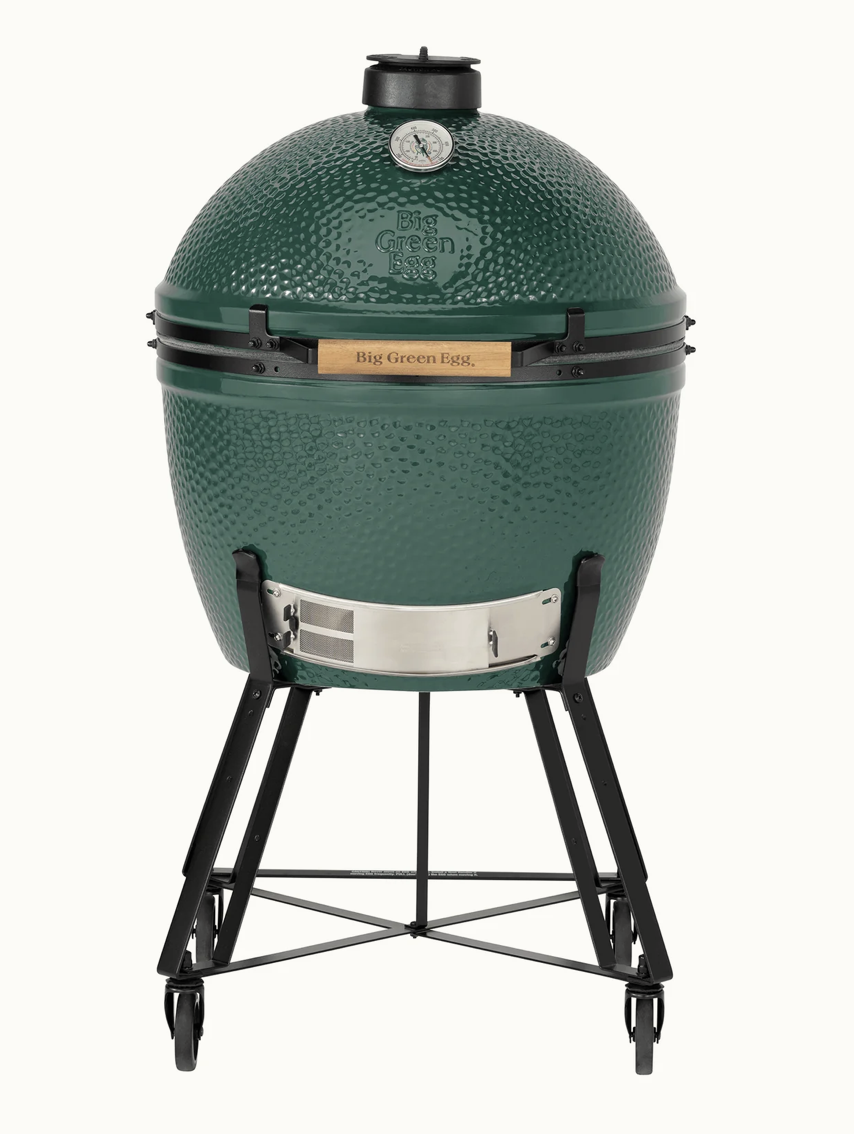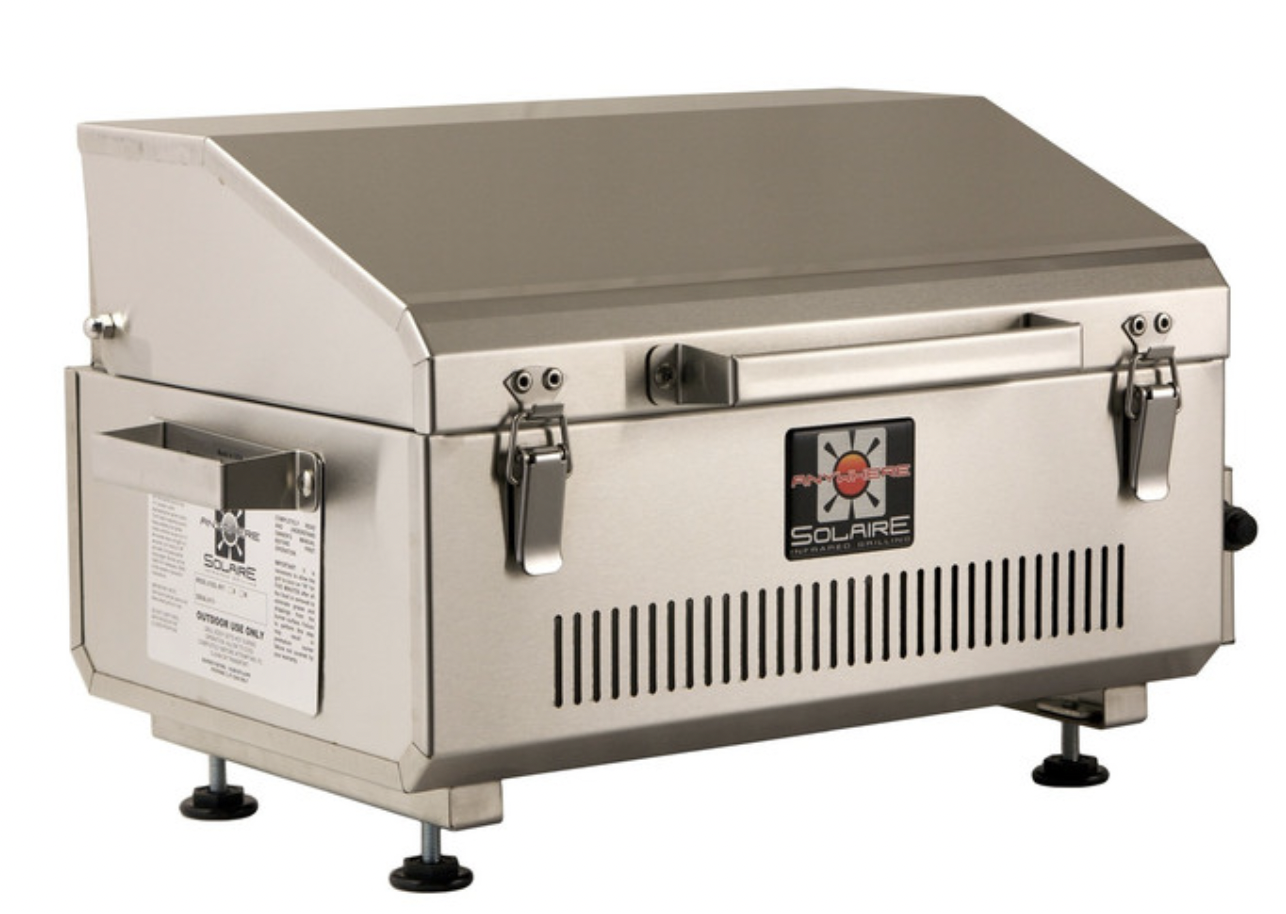Essential Grilling Tips for Beginners
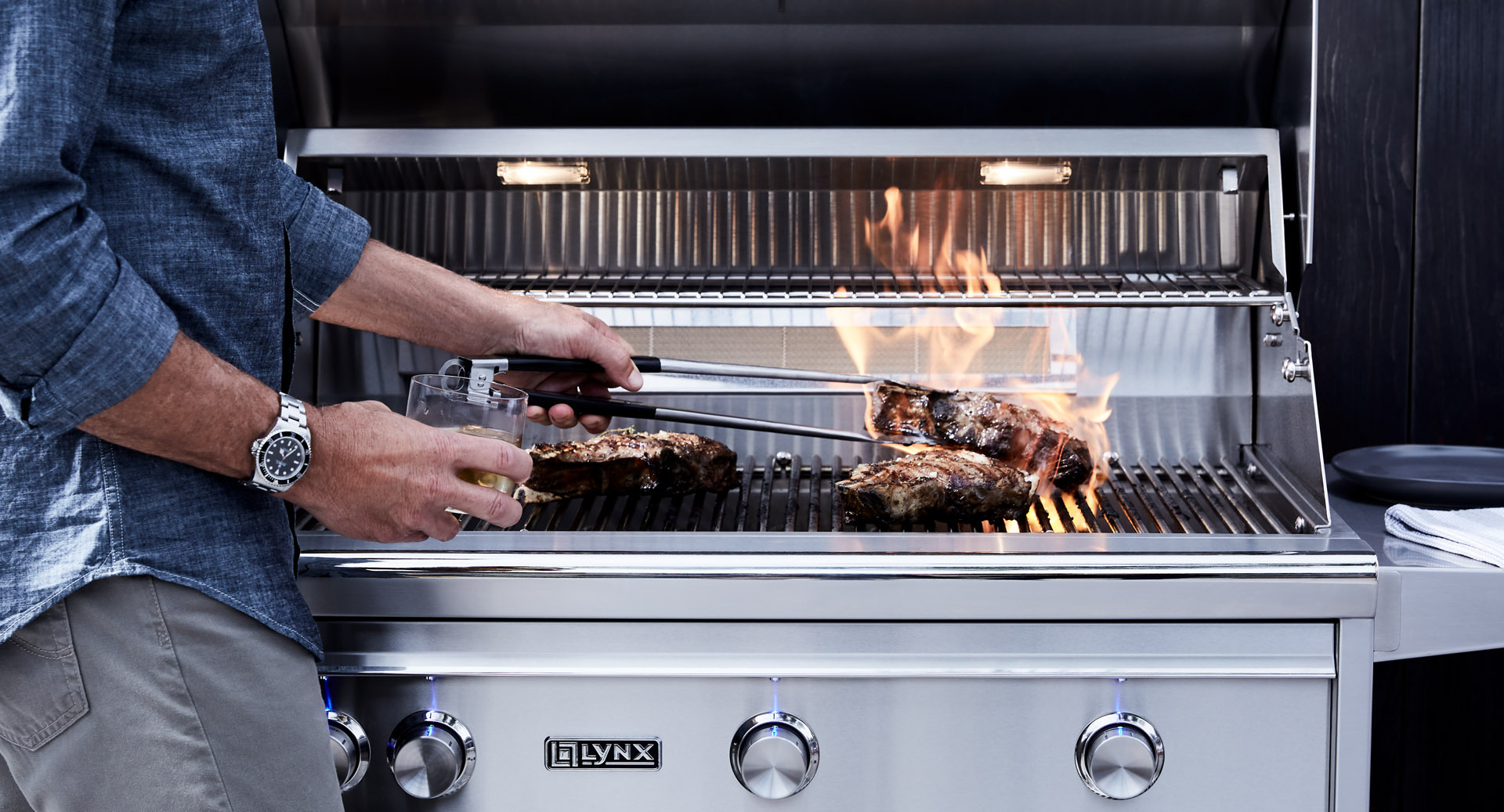
Grilling can be an exciting culinary adventure, especially if you're new to the world of outdoor cooking. With the right guidance and tools, you can master the art of grilling and impress your family and friends with delicious meals. In this guide, we'll explore some essential grilling tips for beginners to help you get started on your grilling journey. From where to start to mastering basic techniques, you'll find everything you need to become a confident griller.
It might seem intimidating at first, but the truth is there's really nothing to fear! The first step in your grilling adventure is selecting the right grill. With so many options available it can be overwhelming for beginners, so we're breaking down all the information you need to help make your decision.
What Are The Best Type Of Grills For Beginners?
The foundation of any great BBQ is, of course, the grill itself. With a wide variety of options available, it's important to consider your space, needs and budget. To help you choose the perfect grill for you and your grilling goals, below is a list of the most popular grills by fuel type:
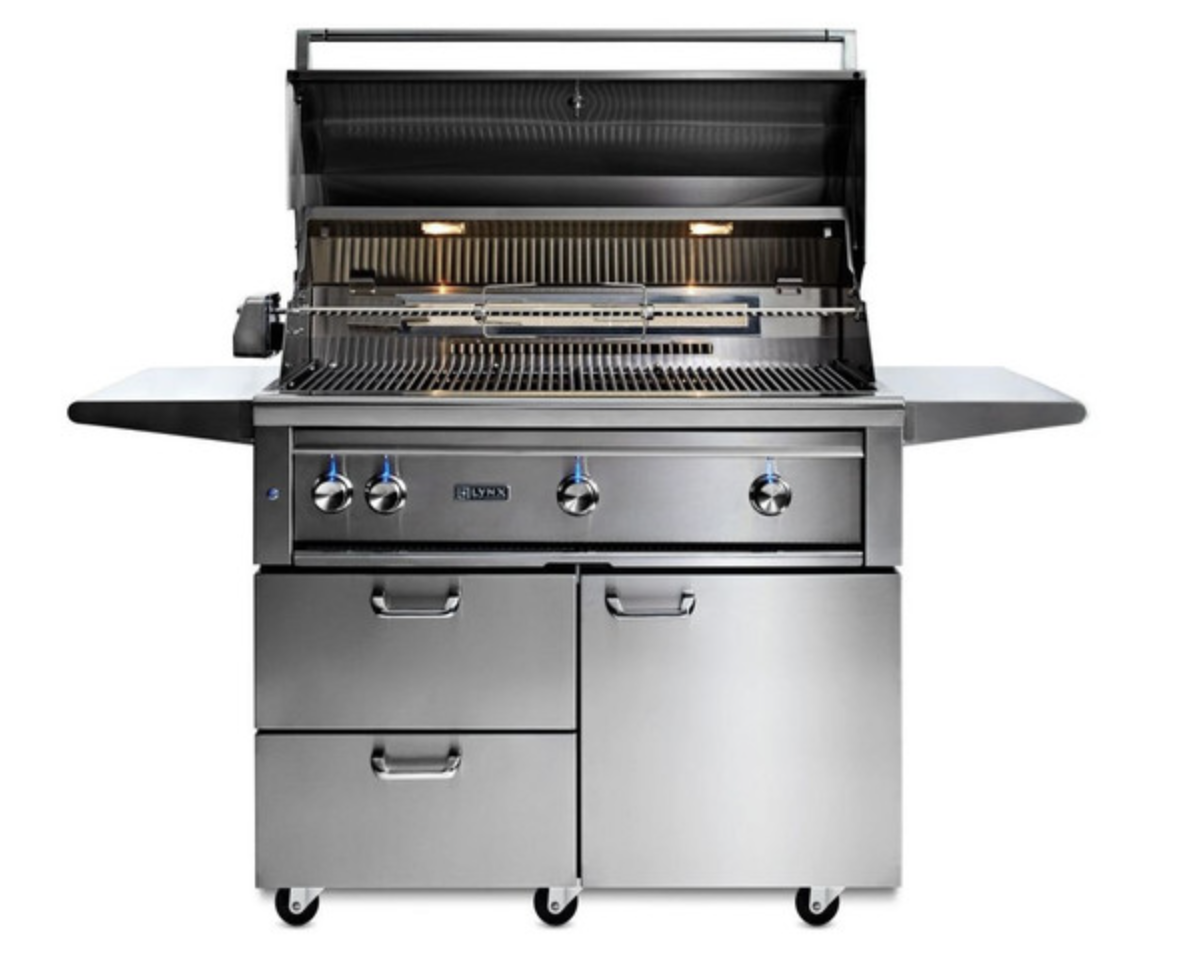
Gas Grills
Gas grills are the perfect option for beginners due to their ease of use. Gas grills also offer versatility, allowing you to easily create many styles and food. They also provide convenience offering quick heat controls and push-button ignition.
Gas grills come with two fuel options - Natural Gas and/or LP (Liquid Propane):
- Natural Gas is piped gas from your home or available utility hookup.
- Propane Gas is often housed in a tank or bottle with the most popular size being 20lbs (often called a BBQ tank)
Some of the most popular gas grill brands are Weber, Napoleon and Delta Heat grills. Napoleon and Delta Heat grills are specifically known for their high quality construction and innovative features.
Charcoal Grills
If you're looking for smoky flavor then a classic charcoal grill is for you! Charcoal grills are a classic choice for many grilling enthusiasts, but can be a bit challenging for beginners. With a little bit of practice and knowledge, it becomes second nature.
Over the years charcoal grills have expanded beyond standard "charcoal" as well - they now include options such as:
- Lump wood charcoal
- Wood pellets
The only "downside" with these grills is they take a bit more effort to light and to maintain a desired temperature. Fortunately, brands like Big Green Egg (which we sell in-store), and Kamado (we sell online) have mastered techniques that make these processes easier.
Electric Grills
Electric grills are often compact and portable, making them ideal for balconies, rooftops, and small patios. Can't have an open flame? That's no problem at all when you're utilizing an electric grill!
While they may not offer the same level of searing as gas or charcoal grills, they're a safe, convenient and can be used indoors or outdoors, making them versatile for any setting. One of our most popular electric grills is the Solaire Anywhere, an infrared portable grill. This grill is constructed with 316 grade stainless steel, making it more resistant to corrosion from salt water and ideal for coastal areas.
Other Considerations
When selecting a grill, consider factors such as size, portability, and budget. Each type of grill has its own set of benefits, so choose one that best suits your needs and preferences.
- Grill Size: Choose a grill size that fits your cooking needs and space—larger for gatherings, compact for small families or limited areas. Consider the grill's footprint and ensure it fits comfortably in your designated grilling area.
- Portability and Mobility: If you plan to take your grill on camping trips or tailgating events, portability is essential. Look for grills with lightweight designs for easy transportation. If you need your grill to be mobile, look for grills that have wheels or are on a cart.
- Budget: Grills come in a wide range of prices, so it's important to establish a budget before shopping. While it might be tempting to buy the cheapest option, you sacrifice performance and longevity. Spending more money now, will save you more in the long run. Consider what features are most important to you and prioritize those within your budget.
Mastering Grilling Techniques
Before you start grilling, understanding the difference between direct and indirect grilling is key to achieving perfect results.
Direct Vs. Indirect Grilling
- Direct grilling involves placing food directly over the heat source. Direct grilling is ideal for cooking items that benefit from a quick sear, such as burgers, steaks, and vegetables.
- Indirect grilling involves cooking food away from the heat. Indirect grilling is best for larger cuts of meat or foods, like roasts or whole chickens that require longer cooking times.
To set up for indirect grilling on a charcoal grill, arrange coals on one side of the grill. On a gas grill, turn on only one or two burners, leaving the others off. Place the food on the cooler side to cook slowly and evenly, allowing the heat to circulate around the food.
Combining Techniques: Multi-Zone Grilling
A combination of both direct and indirect grilling, known as multi-zone grilling, can yield the best results. This technique creates different distinct temperature zones allowing you to grill many different meat types at once.
Start with direct grilling to sear the surface and lock in juices, then move to indirect grilling to finish cooking without burning. This technique is especially effective for thick cuts of meat.
Grilling Tips & Tricks
Preheat The Grill: Always preheat for 10–15 minutes to ensure even cooking and good sear marks.
Oil The Food, Not The Grates: lightly oil your food—not the grates—to minimize sticking and flare-ups
Don't Overcrowd Your Grill: The more food on the grill increases the amount of fat that drips down to your burners and heat distributors. This can lead to more flare-ups and in turn, increases your chance of a fire. Not only that, but your food won't cook as well as it could when everything is smashed together.
Saucing Tip: Don't sauce too soon. If you put sauce on your meat while it is still raw, the sugars in the sauce may burn. This can make the outside of the meat burn before the inside is cooked properly. Especially if you're using BBQ sauce, you want to wait until the last 10-15 minutes to add your sauce.
Controlling Flare-Ups: Flare-ups are best managed by controlling fat drips and using heat zones—never spray water on flames--lower the flame, move to a cool zone and close the lid to put out the flame.
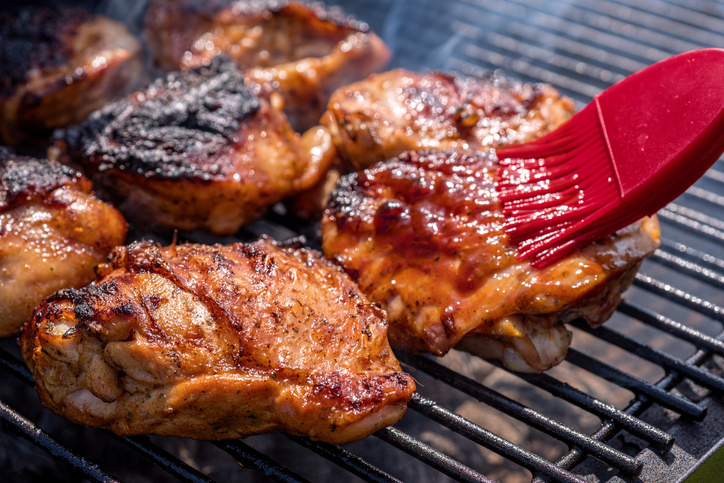
Must-Have Grill Accessories
Equipping yourself with the right grill accessories can significantly enhance your grilling experience. Here are some essentials for beginners:
Essential Tools for Grilling
Having the right tools can make all the difference when grilling. These grill tools provide the leverage and safety needed for a smooth grilling experience.
- Tongs and Spatula: Stainless steel tools are durable and resistant to rust. Long-handled tongs and a sturdy spatula are crucial for flipping and handling food on the grill without burning your hands.
- Basting Brush: To apply marinades, sauces, or melted butter evenly over food while grilling. Look for silicone brushes for high heat resistance and easy cleanup.
- Grill Brush: Some stainless-steel and brass bristle brushes may lose bristles, which stick to the grill and then to your food. We recommend a with a scrubber to avoid this issue. (Pro trip: Find a brush with a replaceable brush heads to save you some money)
Other Grilling Accessories
There are several helpful grilling accessories designed to improve safety, boost convenience, and enhance your overall grilling experience.
- Heat Resistant gloves: Beneficial for handling hot grates or when cooking with charcoal.
- Grill Cover: To protect your grill against the elements and keep unwanted critters out. (TIP: Be sure to see if your grill manufacturer, like Weber, makes a cover for your brand and model grill. This ensures the best fit.)
- Thermometer: Instant-read thermometers provide quick readings, while digital probes can be left in the meat during cooking for continuous monitoring.
- Chimney starter (if you're using a charcoal grill): A chimney starter is an efficient way of lighting coals quickly and evenly without needing lighter fluid. This tool allows for a chemical-free lighting process, preserving the flavor of your food.
- Smoker Box: If you opt for a gas grill and want to add smokey flavor to your food, a smoker box is a great way to do so. It's a metal box that holds wood chips and sits on the burners in your gas grill and adds a rich, smoky flavor to your food without the need for a charcoal or pellet grill. Ideal for infusing meats, veggies, or seafood with that classic BBQ taste.
Grill Safety
Grill safety is particularly crucial for beginners since cooking with high heat and open flames might be unfamiliar. Whether you're using gas, charcoal, or a smoker, taking a few some basic safety measures can prevent accidents and ensure your cookout goes smoothly.
Here are some essential grill safety tips to follow before, during and after grilling:
- Before grilling: Make sure your grill is placed on a flat, stable surface that is a safe distance from structures, trees and flammable objects. Also, make sure your grill is placed in an open area that allows for proper ventilation.
- During grilling: Always keep a fire extinguisher nearby for any unexpected flare-ups, never leave the grill unattended and avoid loose clothing, especially loose long sleeves.
- After grilling: Make sure your grill has fully cooled, all flames are extinguished and the valve on your propane tank is closed (if using gas). Properly clean your grill after each use to prevent future flare-ups and maintain hygiene.
For more detailed guidance on grill safety, be sure to check out our Safe Grilling Guide , which covers 15 things to know before you grill. You can also save our grill safety reference sheet featuring essential do's and don'ts for quick and easy guidance. These resources will help ensure a safe and enjoyable grilling experience.
Time to Grill
So far, we've provided you with some essential grilling tips and knowledge to kickstart your grilling adventure. However, before you fire up your grill for the first backyard barbecue, make sure to follow these key steps to ensure everything goes smoothly.
Read the Manual
This may sound obvious, but read the manual and get to know your grill! While it may not be the most exciting read, the manual offers insight into the functionality and features of your grill. It also provides tips when it comes to your lighting the grill, managing grilling temperatures, safety tips, general maintenance and troubleshooting of your grill. The manual also sometimes features recipes that may tempt you to try grilling something new. Even if you're an experienced griller, it's worth reading the manual when you buy a new grill. It helps you discover new features and functions that your old grill might not have included.
Perform a leak test (Gas Grills)
If you purchased a gas grill, it's important to perform a leak test once the propane tank is attached. This test should not only be done for a brand new grill, but as a part of regular maintenance, when the tank is replaced, or the propane cylinder is refilled. Follow these steps to perform your first leak test:
- Fill a spray bottle with a soap solution that includes equal parts of dish soap or liquid detergent and water.
- Make sure your gas burners and the tank valve turned OFF.
- Spray your soap solution on the tank, where the hose from your grill connects to the tank cylinder and turn on the tank valve.
- Gas flows from the cylinder to the hose, so once you turn on the tank valve, look out for soap bubbles forming in this area.
- If you notice bubbles begin to form there is a leak, indicating to NOT use the grill. If you don't see any bubbles form, you do not have a leak and your grill is safe to use.
Follow these steps to fix your leak and additional tips for what to do if you notice you have a leak.
Seasoning Grill Grates
Seasoning your grill grates prevents food from sticking, guards against rust, and helps extend the lifespan of your grates.
Stainless Steel Grill Grates do not need as much maintenance as cast iron because of the nature of the metal. Follow these steps to prepare and season you stainless steel grates for the first time:
- Remove the grates and clean them well with warm water.
- Make sure your grates are dried completely and no water remains before seasoning.
- Place your grates back on the grill and take a silicone brush or paper towel and apply a thin, even layer of oil. Be sure to coat the grates completely, but wipe off any excess with a paper towel. (TIP: use a high heat oil like Crisco, Vegetable or Canola oil)
- Turn the grill on high heat and preheat for about 15 minutes.
- Let the oil cook for about 15-30 minutes or until the oil starts to burn off or begins to smoke.
- It is normal for your grates to be a dark brown or bronze color. The darker the grates get as you season over time, the more flavor will develop on your grill!
Cast Iron Grill Grates can withstand high temperatures and hold heat efficiently and evenly, making them great for searing. However, they require more time for seasoning and upkeep, as they can rust, dry out, and flake over time when exposed to the elements. Follow these steps to prepare and season your cast iron grates for first time use:
- Remove the grates and wash with warm water and a mild dish soap.
- Make sure your grates are dried completely and no water remains before seasoning.
- Place your grates back on the grill and take a silicone brush or paper towel and apply a thin, even layer of oil. Be sure to coat the grates completely, but wipe off any excess with a paper towel. (TIP: use a high heat oil like Crisco, Vegetable or Canola oil)
- Set the grill to a low to medium heat and let the oil cook for 30-40 minutes. This allows the oil to soak into the grates.
- For the best results, it is recommended to complete this process 2-3 times before your first cook.
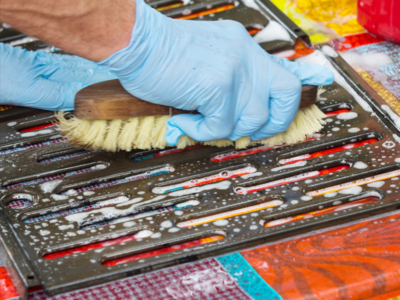
Maintaining and Cleaning Your Grill
Regular maintenance and cleaning are essential for prolonging the life of your grill and ensuring optimal performance. A thorough cleaning should be a regular part of any grill routine, both before and after use. Luckily, with a few simple tools, cleaning your grill doesn't have to be a chore.
Grill Maintenance
- Inspect your grill regularly for any signs of rust, wear or damage. Check burners, hoses, and connections for leaks or cracks and tighten any loose bolts. Addressing minor issues early on can prevent more significant problems down the line.
- Replace any parts that are worn, broken or corroded. Over time, certain grill parts may wear out and require replacement, including grill grates, burners, and ignition. With our part finder, we make it easy to identify and locate any parts that might need replacing.
- At the start and end of each grilling season, perform a thorough cleaning and inspection. This includes checking gas connections, cleaning the interior of the grill, and covering it to protect against weather elements. Proper seasonal maintenance can extend the life of your grill.
Grill Cleaning
- While the grill grates are still hot after grilling, clean your grates with a grill brush to remove food particles and residue.
- For a deeper clean, remove the grates and soak them in warm, soapy water. Rinse them thoroughly and dry them completely before reassembling.
- At least twice a year, your grill should be completely gutted, cleaned and maintained to keep your grill in optimal condition. Disassemble parts such as grates, burners, and drip trays for a comprehensive clean. Use a degreaser or grill cleaner for stubborn buildup, following all safety instructions on the label.
- To clean the exterior of your grill, use a mild soap with a soft cloth, and steer clear of abrasive materials that might scratch the surfaces. Stainless steel polish can help maintain the shine and prevent rust.
If you need a full breakdown on best practices to keep your grill clean, we've got you covered. Follow the steps on how to (properly) clean a gas grill, and get your grill primed and ready for your next BBQ.
Conclusion
Grilling for beginners doesn't have to be intimidating. Choosing the right grill, investing in essential accessories, and mastering basic techniques, can help kickstart your grilling journey.
As you gain confidence, consider exploring advanced grilling methods and accessories like rotisseries or grilling pizzas using specialized pizza stones. As you learn about the art of grilling, you'll realize that there are numerous ways to cook a bountiful barbecue.
With a little bit of knowledge and practice, you'll be whipping up mouthwatering grilled dishes in no time. In no time, your backyard will be the go-to spot for unforgettable BBQ gatherings filled with laughter, good food and memories, all centered around the grill.
Ready to get started? At The BBQ Depot we have all the essential grilling parts, tools and accessories you need to become a backyard BBQ Master. We also have an incredible selection of top-rated BBQ grills, including:
Need help shopping? Our knowledgeable staff is happy to answer any questions you might have! We'll help you find the perfect grill that suits both your needs and budget.
So, what are you waiting for? Shop online, or contact us now, and get ready to create some delicious memories that will last a lifetime!
FAQ
What kind of grill should I buy as a beginner?
While there are many grill options to choose from, for most beginners, a gas grill (propane or natural gas) is the easiest to learn on. It offers:
- Quick start-up and heat control
- Minimal cleanup
- Variety of sizes, styles and fuel options
If you're interested in smoky flavor and enjoy hands-on cooking, consider a charcoal grill. For apartments or fire-restricted areas, an electric grill is a safe alternative.
*Pro tip: Start with a mid-sized gas grill for the easiest learning curve—it gives you consistent heat, fast startup, and simple cleanup
Do I need to clean my grill after every use?
Yes—at least a light cleaning is important after each use to keep your grill safe, clean, and working properly. Regular cleaning not only improves flavor, it helps your grill last longer and reduces the risk of fire. The key components that should be cleaned after every use are the grill grates and grease tray.
How do I set up direct vs. indirect heat zones on a gas grill?
- Direct heat: Turn burners on under the food for searing and fast cooking (burgers, steaks).
- Indirect heat: Turn burners on to one side, place food on the other. Great for slow-cooking thick cuts or delicate foods (whole chicken or roasts).
- Two-zone setup: Turn on one half of the burners and leave the other off.

